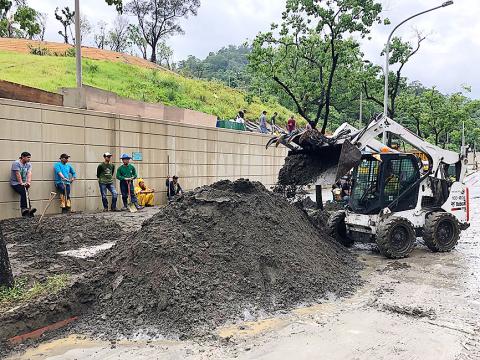The American Institute in Taiwan’s (AIT) new compound in Taipei’s Neihu District (內湖) was affected by mudflows yesterday as Typhoon Maria swept through northern Taiwan, but the facility did not sustain any damage, AIT spokeswoman Amanda Mansour said.
The compound was surrounded by mudflow streams in the morning, when the typhoon was moving in a west-northwest direction, packing sustained winds of 108kph and gusts of up to 137kph.
The Central Weather Bureau lifted sea and land warnings at 2:30pm yesterday, after the typhoon made landfall in China’s Fujian Province.

Photo: CNA
“We are aware of reports about issues at the new office compound caused by last night’s storm. The construction team is currently addressing the storm’s impacts on our grounds, which were relatively minor,” Mansour said.
The new facility, which cost the US government US$255.6 million and took nine years to complete, is built on a hill on Jinlong Road and covers 6.5 hectares.
Officially unveiled in a closely watched dedication ceremony on June 12, the new compound is the first purpose-built facility by a foreign representative office in Taiwan and has been praised as an important milestone in Taiwan-US ties.
Despite the compound’s completion, the AIT is not to move its offices until later in the summer.
Outgoing AIT Director Kin Moy, who is to leave his post later this week, has said that the move is likely to happen sometime near the US Labor Day holiday, the first Monday in September.
The AIT, which was established in 1979 after Washington severed ties with Taipei, serves as the US’ de facto embassy in Taiwan in the absence of formal diplomatic ties.

An essay competition jointly organized by a local writing society and a publisher affiliated with the Chinese Communist Party (CCP) might have contravened the Act Governing Relations Between the People of the Taiwan Area and the Mainland Area (臺灣地區與大陸地區人民關係條例), the Mainland Affairs Council (MAC) said on Thursday. “In this case, the partner organization is clearly an agency under the CCP’s Fujian Provincial Committee,” MAC Deputy Minister and spokesperson Liang Wen-chieh (梁文傑) said at a news briefing in Taipei. “It also involves bringing Taiwanese students to China with all-expenses-paid arrangements to attend award ceremonies and camps,” Liang said. Those two “characteristics” are typically sufficient

The brilliant blue waters, thick foliage and bucolic atmosphere on this seemingly idyllic archipelago deep in the Pacific Ocean belie the key role it now plays in a titanic geopolitical struggle. Palau is again on the front line as China, and the US and its allies prepare their forces in an intensifying contest for control over the Asia-Pacific region. The democratic nation of just 17,000 people hosts US-controlled airstrips and soon-to-be-completed radar installations that the US military describes as “critical” to monitoring vast swathes of water and airspace. It is also a key piece of the second island chain, a string of

A magnitude 5.9 earthquake that struck about 33km off the coast of Hualien City was the "main shock" in a series of quakes in the area, with aftershocks expected over the next three days, the Central Weather Administration (CWA) said yesterday. Prior to the magnitude 5.9 quake shaking most of Taiwan at 6:53pm yesterday, six other earthquakes stronger than a magnitude of 4, starting with a magnitude 5.5 quake at 6:09pm, occurred in the area. CWA Seismological Center Director Wu Chien-fu (吳健富) confirmed that the quakes were all part of the same series and that the magnitude 5.5 temblor was

The Central Weather Administration has issued a heat alert for southeastern Taiwan, warning of temperatures as high as 36°C today, while alerting some coastal areas of strong winds later in the day. Kaohsiung’s Neimen District (內門) and Pingtung County’s Neipu Township (內埔) are under an orange heat alert, which warns of temperatures as high as 36°C for three consecutive days, the CWA said, citing southwest winds. The heat would also extend to Tainan’s Nansi (楠西) and Yujing (玉井) districts, as well as Pingtung’s Gaoshu (高樹), Yanpu (鹽埔) and Majia (瑪家) townships, it said, forecasting highs of up to 36°C in those areas